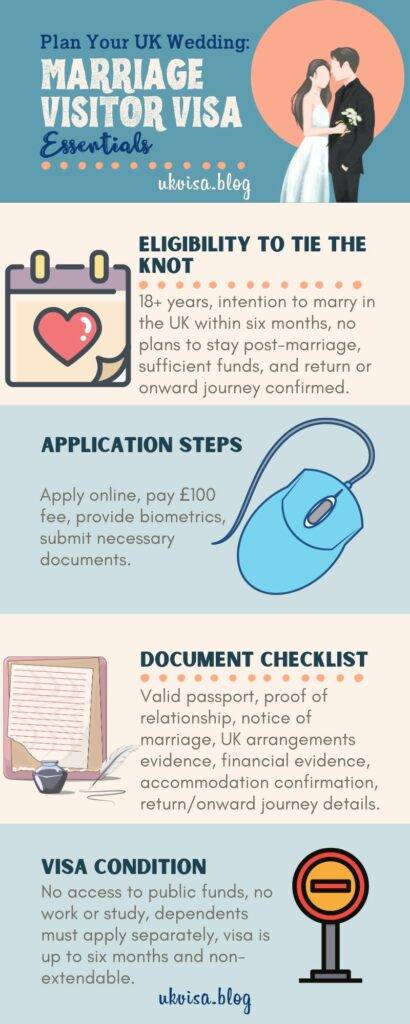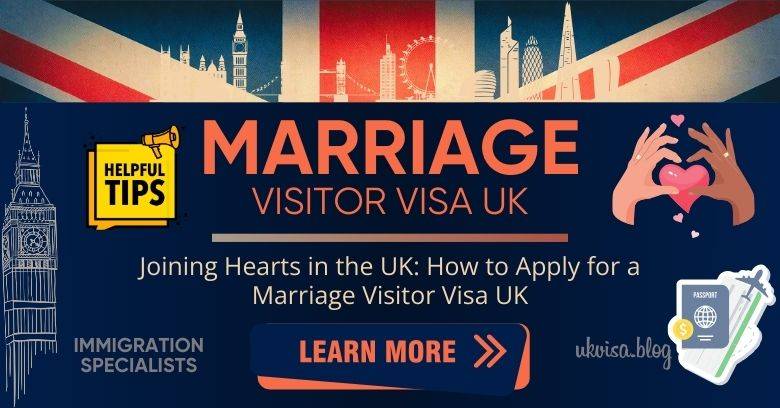Marriage Visitor Visa UK 2024! Planning your wedding in the United Kingdom is an exciting prospect, and obtaining a Marriage Visitor Visa is an essential step for those wishing to marry in the UK in 2024. This guide provides comprehensive details on the requirements, ensuring you understand every aspect of the visa application process. From proving genuine intentions to get married to choosing the correct visa for your marital plans, this resource offers crucial information and tips to help you navigate the application process smoothly, including the necessary supporting documents.
Table of Contents
1. Marriage Visitor Visa Requirements 2024
Planning to get married or enter a civil partnership in the UK? The Marriage Visitor Visa is designed for individuals who intend to visit the UK specifically for this purpose. Here’s a detailed overview of the eligibility criteria and essential requirements to help you prepare for your application.
Eligibility Criteria for Marriage Visitor Visa UK
Before applying, ensure you meet the following criteria:
- You must be 18 years or older.
- You intend to marry or enter a civil partnership in the UK within six months of your arrival.
- You have no plans to stay in the UK after your marriage or civil partnership.
- You have sufficient financial resources to cover your stay without accessing public funds.
- You can meet the cost of your return or onward journey.
- You comply with all other UK immigration rules.
Note: As of 1 January 2021, EEA nationals also require this visa for marriage in the UK.
Notice of Marriage or Civil Partnership
When applying for a Marriage Visitor Visa, you must give notice of your marriage or civil partnership. Here’s what you need to know:
- Requirement:
- You must give notice of marriage or civil partnership.
- Process:
- In England and Wales, give notice in person at a local register office at least 29 days before the ceremony.
- In Scotland and Northern Ireland, you can give notice by post.
- Details to Include:
- Full name, date of birth, occupation, nationality, current address, and evidence of identity and nationality.
- Waiting Period:
- At least 28 days before the ceremony.
- This period can extend to 70 days for non-British/Irish citizens or those subject to immigration control.
Ensure you have all the required documents and information to make the process smooth and efficient. Preparing thoroughly will help you avoid delays and ensure that your special day goes as planned.

2. Application Process for UK Marriage Visitor Visa 2024
Applying for a UK Marriage Visitor Visa involves several crucial steps and requires careful attention to detail. This visa allows you to come to the UK for the purpose of getting married or entering into a civil partnership. To ensure a smooth and successful application, it is important to follow the outlined process, gather all necessary supporting documents, and adhere to the specified guidelines. Below is a detailed breakdown of the application process for the Marriage Visitor Visa in 2024.
Applying for Marriage Visitor Visa
- Online Application:
- Complete the Marriage Visitor Visa application (Form VAF1F) on the UK Government’s official website.
- Visa Fee:
- Pay the visa fee of £100 (subject to change) online.
- Biometric Information:
- Provide fingerprints and a digital photograph at a visa application center.
- Submission of Documents:
- Submit supporting documents by post or in person.
Supporting Documents Required
When applying for a Marriage Visitor Visa, you must provide various documents to support your application:
- Valid Passport:
- Must have at least one blank page.
- Evidence of Relationship:
- Photos, correspondence, travel documents.
- Notice of Intention for Marriage:
- Appointment card or email correspondence, if applicable.
- Evidence of Arrangements in the UK:
- Payment receipts, booking confirmations, correspondence with religious institutions, etc.
- Proof of Financial Resources:
- Bank statements, payslips, savings documentation.
- Accommodation Confirmation:
- Hotel bookings or a letter from your host.
- Return/Onward Journey Documentation:
- Travel itinerary, airline tickets.
Other Aspects of the Marriage Visitor Visa UK
Here are some additional considerations regarding processing time, duration of stay, and restrictions:
- Processing Time:
- Usually around three weeks, but applying three months in advance is recommended to accommodate potential delays.
- Duration of Stay:
- Up to six months in the UK. The visa cannot be extended, nor can you switch to another visa category.
Restrictions on the Marriage Visitor Visa
While in the UK on this visa, you are not permitted to:
- Access public funds.
- Work or study.
- Bring dependents (they must apply separately).
- Live in the UK for extended periods through frequent visits.
Extension Requirements for Marriage Visitor Visa
- Typical Duration:
- 2-3 months is usually sufficient for marriage-related activities, including a post-marriage honeymoon.
- Extension Policy:
- Applying for an extension is generally not appropriate and has very remote chances of success, except in exceptional circumstances.
Successfully applying for a UK Marriage Visitor Visa involves a clear understanding of the eligibility criteria, a thorough application process, and gathering the necessary supporting documents. By carefully following these guidelines and ensuring all documentation is accurate and complete, applicants can look forward to their marriage or civil partnership in the UK.
3. Genuine Intentions to Get Married in the UK
Establishing genuine intentions for marrying or forming a civil partnership in the UK is crucial for the success of your Marriage Visitor Visa application. The evidence provided should convincingly demonstrate that your plans are bona fide and not a sham.
Evidence of Genuine Intentions
- Marriage/Civil Partnership Arrangements:
- Payment receipts for venue.
- Correspondence with the registered office for booking confirmation.
- Correspondence with religious institutions.
- Other relevant arrangements.
- Notice of Intention:
- Confirmation of a provisional booking.
- Appointment card or email correspondence with the registered office.
- Proof of Authentic Relationship:
- Detailed arrangements for the marriage/civil partnership.
- Evidence of the relationship’s strength and genuineness, including the history of how and when you met, background, interests, and education level.
- Future plans post-marriage.
- Living arrangements after the marriage/civil partnership.
Avoiding the Perception of a Sham Marriage
To prevent the application from being perceived as a sham marriage or civil partnership, the applicant needs to furnish comprehensive evidence. This includes clarifying the relationship’s authenticity and the solidity of future plans. Failure to satisfy these criteria can lead to refusal under Paragraph V 6.3 (c) of Appendix V.
4. Choosing the Right Visa for Marital Plans
The Spouse, Fiancé(e), and Marriage Visitor Visas cater to different needs and intentions for couples planning to marry or form a civil partnership in the UK. It’s crucial to choose the appropriate visa based on your future plans and duration of stay.
Comparison of Visa Options
- Purpose:
- Spouse Visa: For long-term settlement with a partner in the UK.
- Fiancé(e) Visa: To marry or form a civil partnership in the UK, followed by settlement.
- Marriage Visitor Visa: Solely for marriage or civil partnership in the UK, without plans to settle.
- Duration:
- Spouse Visa: 33 months (from outside the UK) or 30 months (within the UK), extendable.
- Fiancé(e) Visa: 6 months duration, with expectation to switch to a Spouse Visa post-marriage.
- Marriage Visitor Visa: Valid for 6 months, no extension permitted.
- Work and Study Rights:
- Spouse Visa: Permitted to work and study.
- Fiancé(e) Visa: Study allowed; work prohibited.
- Marriage Visitor Visa: No rights to work or study.
- Access to Public Funds:
- Spouse Visa: Possible after fulfilling specific criteria.
- Fiancé(e) Visa: Not permitted.
- Marriage Visitor Visa: Not permitted.
- Application Complexity:
- Spouse Visa: Comprehensive documentation required, including proof of relationship.
- Fiancé(e) Visa: Detailed documentation needed, emphasizing relationship and marriage plans.
- Marriage Visitor Visa: More straightforward application, limited documentation.
Choosing the right visa for marriage or a civil partnership in the UK depends on your long-term intentions. The Marriage Visitor Visa is ideal for those who plan to marry in the UK without settling there. Understanding the differences in terms of purpose, duration, rights, and application processes is key to making an informed decision. Ensure you apply well in advance and prepare all necessary documents for a smooth application process. Happy wedding planning!
5. FAQs: Marriage Visitor Visa UK Requirements
-
Can I switch from a Marriage Visitor Visa to a Spouse Visa while in the UK?
No, you cannot switch from a Marriage Visitor Visa to a Spouse Visa while in the UK. You must leave the UK and apply for a Spouse Visa from your country of residence.
-
Can I bring my children with me on a Marriage Visitor Visa UK?
No, dependents are not allowed on a Marriage Visitor Visa. They must apply separately for their own visas.
-
How far in advance should I apply for a Marriage Visitor Visa UK?
It is recommended to apply at least three months before your intended travel date to allow for any potential delays in processing.
-
Can I get married in the UK on a Standard Visitor Visa?
No, you must obtain a Marriage Visitor Visa or a Spouse Visa to get married or form a civil partnership in the UK.
-
What happens if my Marriage Visitor Visa UK application is denied?
If your application is denied, you will receive a notice explaining the reasons for refusal. You have the option to address the reasons and reapply or appeal the decision if you believe there has been an error in the assessment.
For further details, please refer to Appendix V for Visitors of the UK Immigration Rules.

